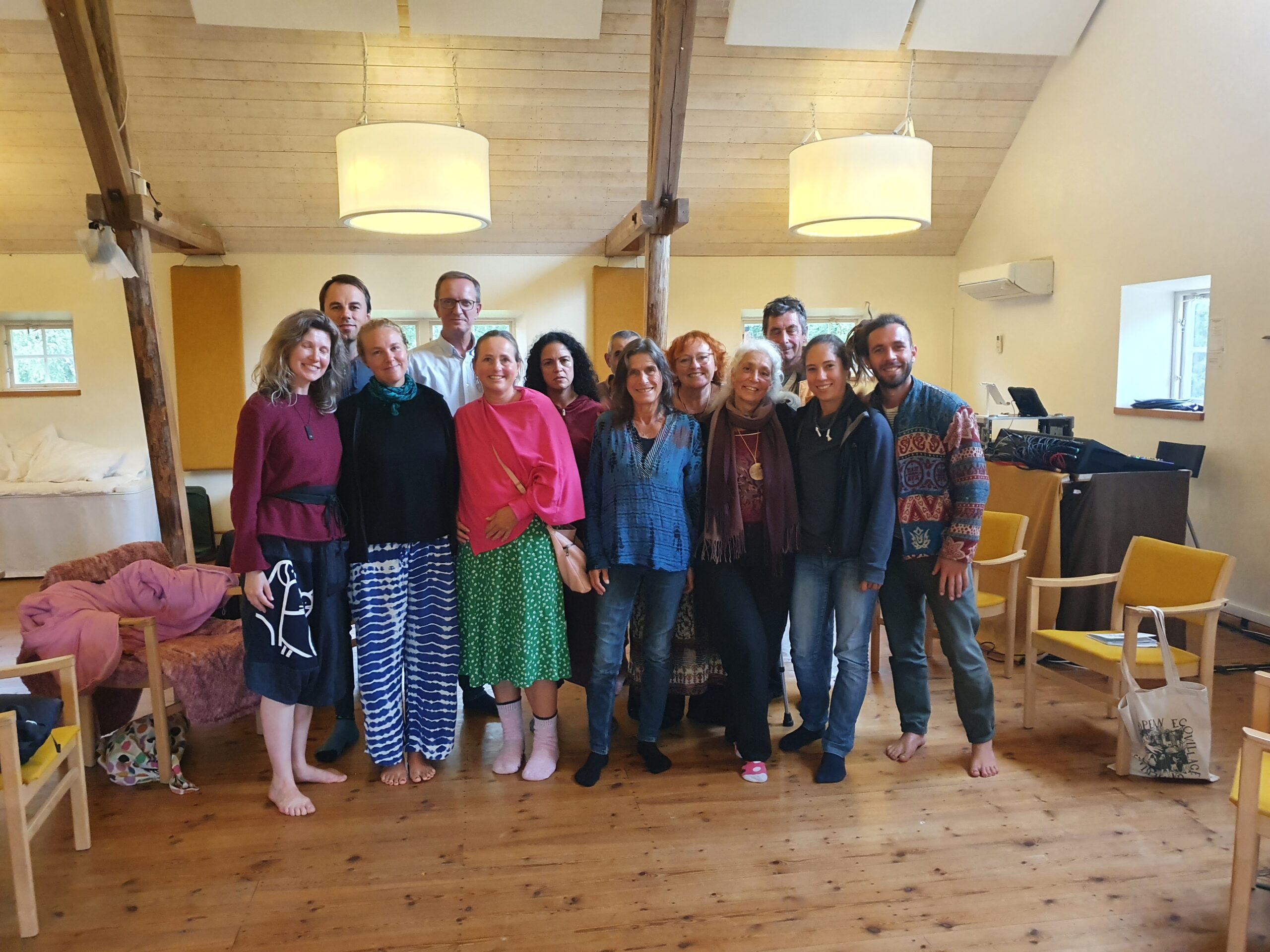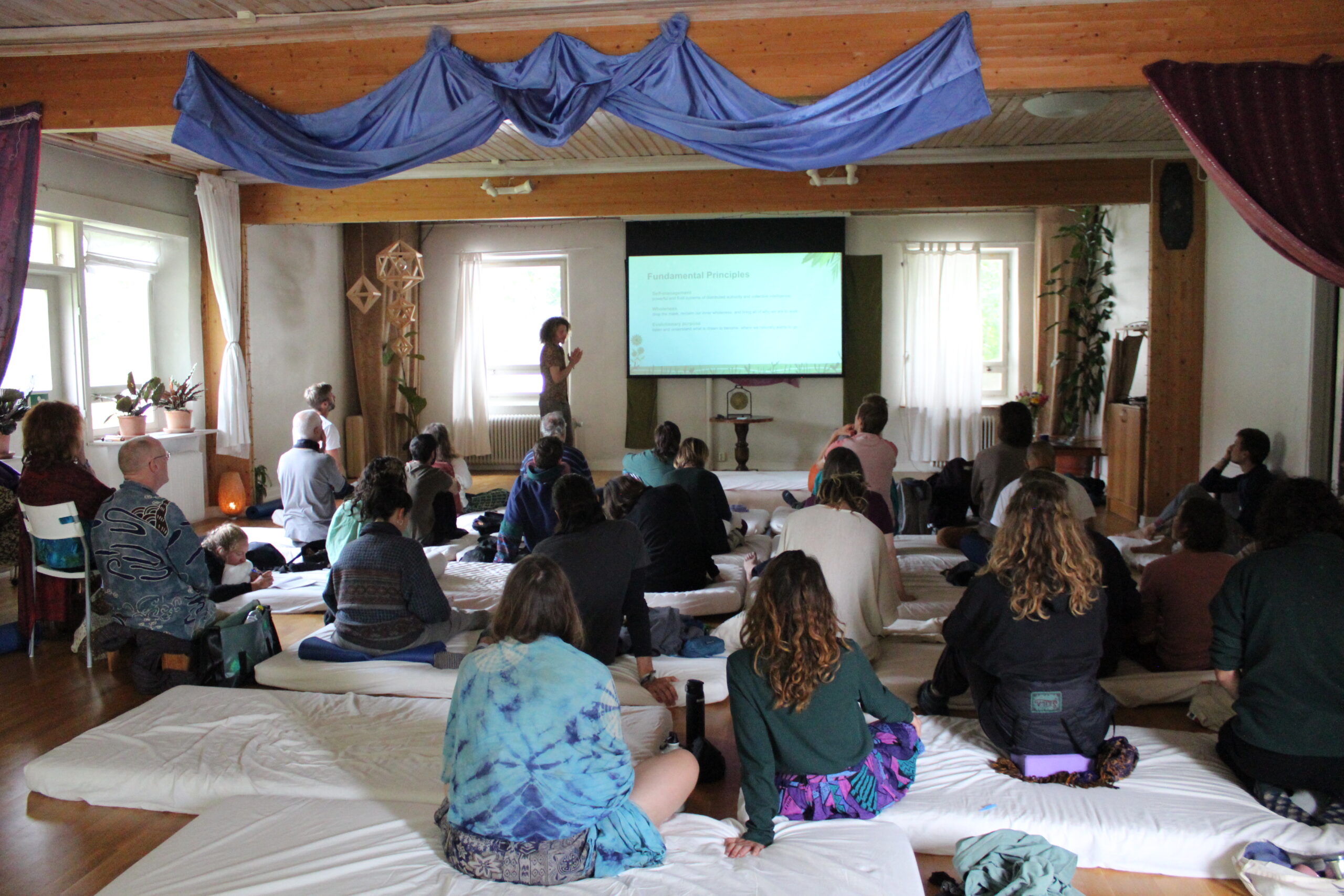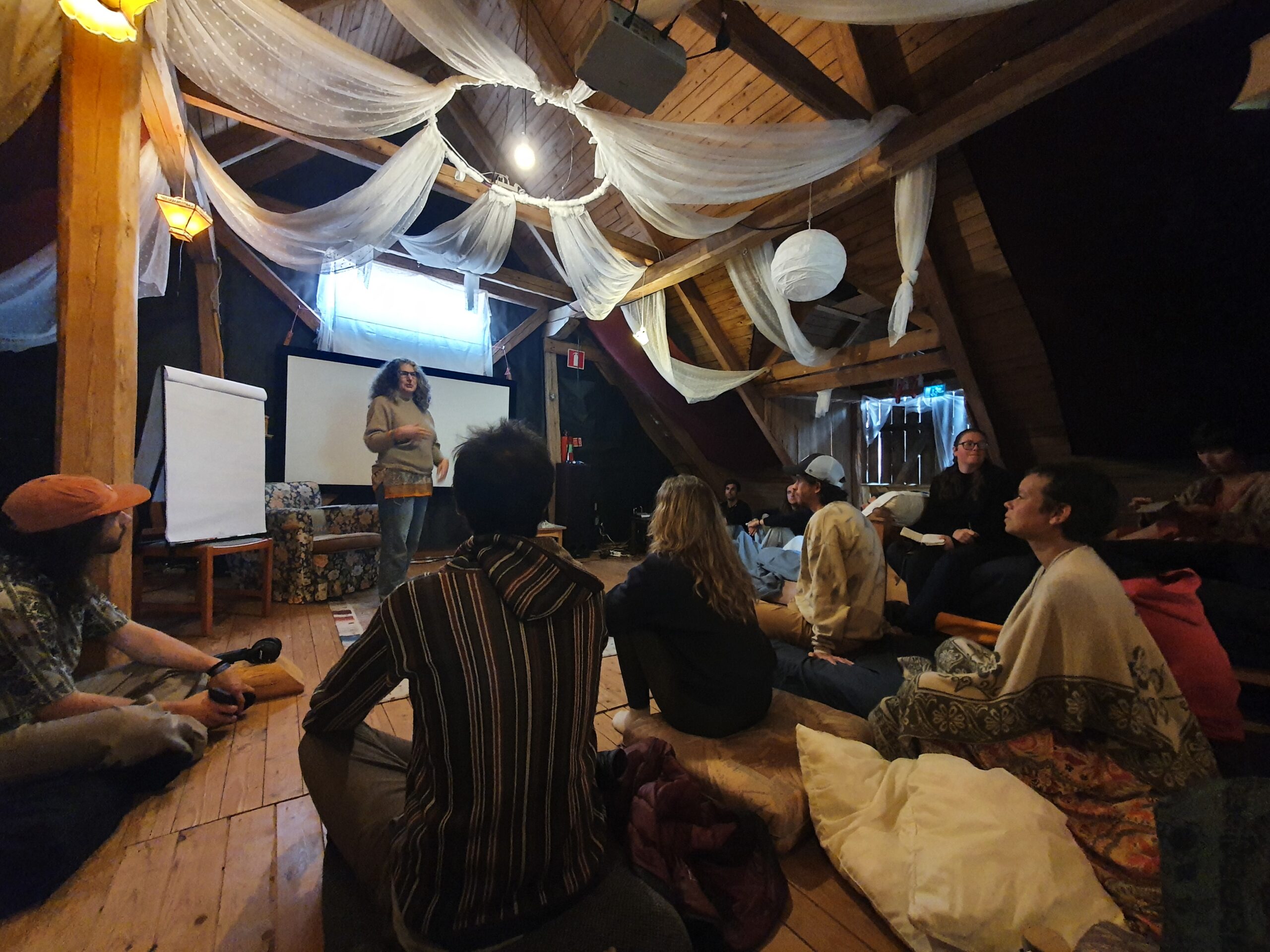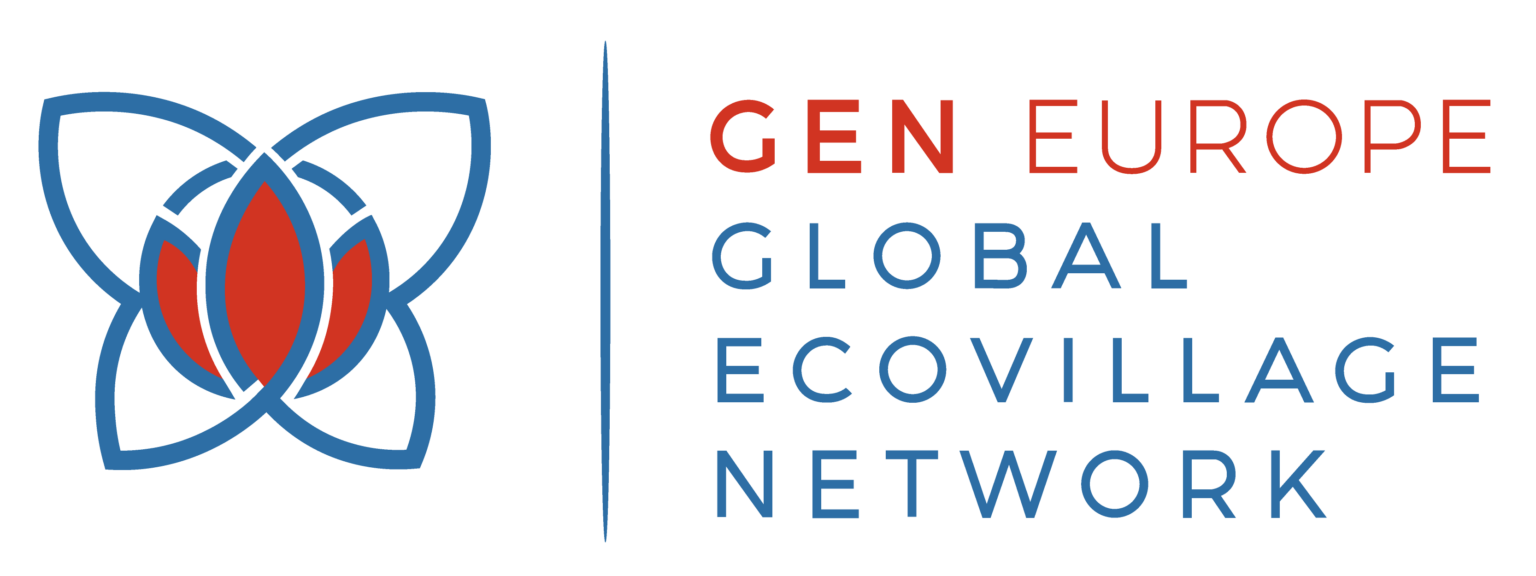Northern European Gathering
The Northern European Gathering of COM4LGD took place in Angsbacka, Molkom, Sweden, as part of the broader 2024 European Ecovillage Gathering, which took place on August 20-24, 2024. Organized under the WP4, the Northern European Gathering aimed to develop and share knowledge and insights about under-explored dimensions of democratic participation and environmental engagement by community-led initiatives (CLIs). The goal was to support for Local Action Groups and stakeholders to create sustainable and regenerative community initiatives.

The different workshops organized in the framework of the Northern European Gathering of COM4LGD highlighted the importance of, when identifying barriers and opportunities for participation, considering organizational differences in community-led initiatives across Europe, and interpreting them as manifestations of long-terms historical trends and resulting socio economic and cultural contexts. What is considered the Northern European Region in this project should not be considered a homogenous region, as it reflects significantly different historical trajectories and political legacies that impact not only how collectives relate to the state, but also how people relate to each other and the environment. The Northern European region includes two sub-regions: The Northwest, marked by a long standing social democratic tradition that has been weakened in recent decades by neoliberalism, successive financial crisis, and a decline in public trust, and the Northeastern tradition, marked by the legacy of Communism, COMECON and the pressure of its geographical proximity to a neo-imperialist Russia.

The workshop highlighted the importance of considering such geographical diversity, as well as its political implications, so as to facilitate peer-to-peer cooperation among CLIs in the sharing and learning from best practices, as well as contextualize the sharing of practical tools and methodologies, in terms of integrating both democratic processes and environmental advocacy into local projects. The session drew participants from diverse backgrounds within and beyond the two Northern European sub-regions, including ecovillage members, representatives of national ecovillage networks, representatives of academic institutions taking part in the COM4LGD consortium, and representatives of municipal and regional public authorities.
Workshop Objectives:
- Facilitate discussions on political, socio economic and cultural dimensions affecting democratic participation and environmental engagement in community-led initiatives.
- Empower CLI members and stakeholders to foster active citizen involvement in local decision-making.
- Share practical tools and experiences to help communities address environmental challenges through grassroots action.
- Motivate communities by exploring the drivers behind democratic participation in local governance and environmental advocacy.
Program Breakdown:
– August 21st at 6 p.m. : Meeting and welcoming COM4LGD guests and consortium representatives, followed by dinner in the COM4LGD designated area.
– August 22nd, 23rd, and 24th : COM4LGD sessions will run daily from 11:30 a.m. to 1:30 p.m., covering four themes: Collective Governance, Activism, Social Justice, and Ecovillage Economics.
– August 24th at 5 p.m. : Final reflection and evaluation meeting with guests and the consortium.
– August 26th : A field trip to a sustainable project near Ängsbacka.
List of COM4LGD sessions:
| COLLECTIVE GOVERNANCE | |
| 22.8. Silvia Pinciroli: Group focalisation: helping groups access a new level of potentiality | Explore the theory and practice of group dynamics, focusing on structure, consciousness, and the focaliser role. Learn about how to apply the group wisdom to work towards a greater good and to be a focal point enabling groups potential to express at its highest |
| 23.8. Zahra Lightway: Deepening Sociocratic practices | Deepen your understanding of sociocratic values, giving your consent and decision-making processes through role play and discussion. Medium knowledge required. |
| 24.8. Gabriel da Rocha: Holacracy – horizontal governance for transparency in decision-making | Holacracy—a horizontal governance model designed to enhance well-being in decision-making- will be presented in theory and practice. |
| ACTIVISM | |
| 22.8. Selma Eliisa Kilpi: SAMPO-culture discussion | Holistic sustainability in the light of old Fenno-Ugric poetry and mythology. Lecture and circular discussion. |
| 23.8. Mieke Elzenga & Petra Schepens: Importance of Community-Led Initiatives in making global changes | Global changes through eco-communities, with the cooperation between initiatives, citizens, youths and governments. Only by cooperation can we make the change. |
| 24.8. Peter Gringinger & Taisa Mattos: Building bridges for sustainability: exploring tools and frameworks for inner and outer development | Explore Gaia Education and UNESCO tools to engage with multiple stakeholders on topics related to sustainability and regeneration using the Sustainable Development Goals (SDGs) framework and the Inner Development Goals (IDGs). |
| SOCIAL JUSTICE | |
| 22.8. Maccaco Tamerice: Trauma and community | This workshop will look into trauma and some of the reasons for trauma development and offer practical experiences on how community can be an important trigger-support for it’s integration. |
| 23.8. Leon Herweg: To Declutter our Colonial Minds | We will take 7 Steps Backwards to rethink, challenge the ways we think and relate; and 7 Steps awkward, because who says forward is the right way? Playfully engage and deeply share |
| 24.8. Vanessa Moutinho & Stanley Lima: Returning home: a brave space to acknowledge privileges – and hack racial, gender, social constructs. | What does it take to feel as one? And what doesn’t? We invite you to embrace your authenticity and identity. To empower yourself to name & address issues of our times. Courageously. Together. Towards love, justice and prosperity for all. |
| ECOVILLAGE ECONOMICS | |
| 22.8.Grace Rachmany: Death Economy vs. Life Economy | Why is a dead tree worth more money than a live tree? Explore why most “new economy” ideas fail and how to think about an design a life-supporting economy. |
| 23.8. Jason Nardi & Monika Onyszkiewicz: Building a local food community. From commodities to commons and solidarity economy | The right to good quality, healthy, locally grown food is in our hands, with solidarity economy practices. Get inspired by transformative local food policies and ecosystems which build community. |
| 24.8. Johannes Kübel & Anna Kovasna: GEN Europe Fund – Empowering new communities through financial support | Come learn about solidarity financing for new ecovillages and our plans for creating a Europe-wide economic support system for more communities to emerge |
Attendees were invited to share personal stories and insights around several questions:
- How to balance the post-materialist values and expressive dimension of the ecovillage movement (“personal transformation”, “become what you are”, “looking into each other’s eyes”, “conscious relationships”, “trauma healing”), with the need of: 1) addressing the structural inequalities that produce the socioeconomic privilege that ensure enough material stability, as well as sense of inherent worth and self-esteem, for certain sectors of the population to engage with such values and dimension; 2) promoting cultural sensitivity in peer-to-peer collaboration among ecovillagers.
- How to address the way in which mechanisms of identity ascription, hierarchization and exclusion present within mainstream society (i.e. gender, class, nationality/ethnicity, education, territorial location) often creep into ecovillages and other transformative projects, despite their stated goals of overcoming them.
- How to promote the ecovillage model in areas of the world where commons-oriented models have been historically associated with political oppression and economic deprivation (e.g. post-communist countries).
- How to engage the ecovillage model, as well as other CLI models, in addressing how extractivism and the geopolitical competition among “great powers” is leading to a retraction of environmentally-friendly policies, as well as increased belicism and genocide.
- How to avoid a “savior complex” from the part of ecovillages and other CLIs based in countries with more robust democratic traditions and economies.
- in certain part promote a harmonious combination between the everyday tasks and demands of managing a community-led initiative (CLI), and those of participating in decision-making within CLIs, as well as within LAGS, and that the regional, national and supranational political decision-making and policy implementation.
- of LAGs, etc.

Key Takeaways:
- Community empowerment: the workshops highlighted the importance of empowering local communities by giving them the tools and support to lead their own democratic and environmental initiatives. When communities feel ownership, they are more committed to long-term success.
- Environmental advocacy: participants agreed that local advocacy is crucial for influencing environmental policies. Working together at the community level can lead to meaningful changes in environmental protection and sustainability.
- Motivations: participants noted that ecovillagers are often motivated by very personal, often unspoken motivations when engaging in ecovillages (such as self-discovery, emancipation from strict gender, class and behavioral expectations), or simply because they aim to build a livelihood in which there is no contradiction between work, private life and personal fulfillment, by working together with people they like, creating time and space for self-discovery and fulfillment, and pursuing cultural and spiritual goals. This can lead to an estrangement with mainstream culture, which can only be endured with a solid support network.
- Ecovillages as promoters of resilience in times of crisis: The expressive and post-materialist motivations underlying many ecovillages can promote a significant level of collective resilience in context of crisis, as attested by testimonies from the Ukrainian Ecovillage Network. However, for such motivations to translate into collective resilience, they must be potentialized by solid social technologies for fostering collective governance.
- Ecovillages as “oases of emancipation” and “greenhouses of hope”: As attested on the workshop on gender issues in ecovillages, these can be experienced as spaces where people can experiment ways of existing and interacting outside the rules and expectations of mainstream society. This can be experienced as deeply empowering and emancipatory. However, for that to be possible, ecovillages need to adhere to emancipatory values and be made accountable by a network of peers.
- The need to address historical and intergenerational trauma, as well as political cultures and legacies: Creating spaces for addressing the individual and collective manifestations of these factors, as well as promoting trauma-informed intercultural dialogue, is fundamental for deepening peer-to-peer cooperation among ecovillages in terms of sharing tools and best practices for democratic participation.
- The need to bring power and politics further into debate, strategy and action within the ecovillage movement.

Conclusion:
The workshop provided a valuable platform for ecovillagers and other stakeholders to share insights and experiences, and strategies on often unaddressed dimensions of democratic participation and environmental advocacy. The workshops successfully demonstrated that addressing such topics is fundamental for empowering communities with the right tools and methodologies for enhancing local governance and increasing peer-to-peer collaboration
The insights shared during the event underscore the importance of grassroots action in addressing global challenges such as climate change, political polarization and increased geopolitical conflict.
Moreover, the discussions revealed that motivations for participation often stem not only from financial interests, a sense of urgency driven by shared challenges like climate change or a war, but also from expressive motivations and goals, such as the search for personal emancipation and authenticity, or the enjoyment of working together on meaningful projects. Recognizing and harnessing these motivations can lead to greater community engagement and more impactful outcomes. The workshops also showed that taking historical and intergenerational legacies (including trauma) into account plays a crucial role in fostering democratic participation, as it opens doors to deeper interpersonal understanding, collaboration and community engagement.
Overall, the workshop was an important step in reinforcing the role of local communities as key actors in the European sustainability agenda. It offered practical guidance for fostering collective action and showcased the power of community-led initiatives in shaping a regenerative and democratic Europe.



